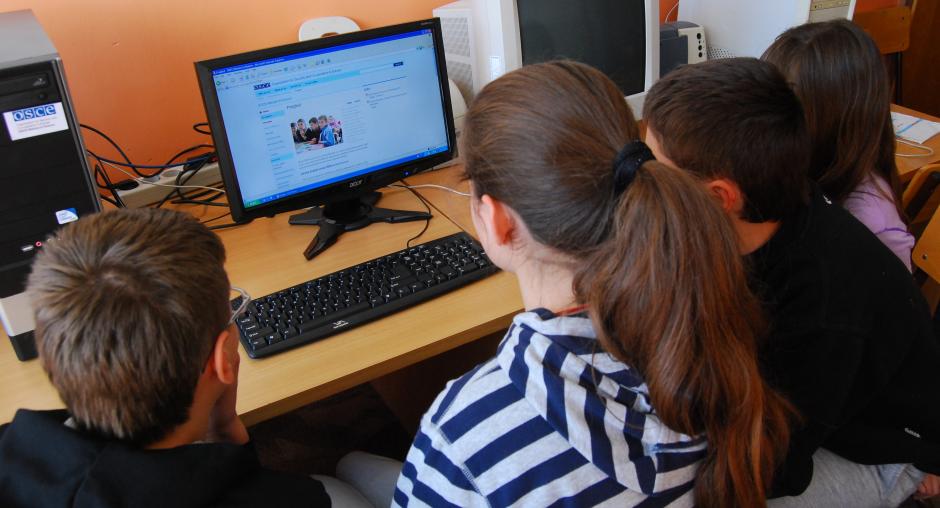OSCE Mission improves education for Kosovo communities
“It's fun to use computers at school,” exclaims nine-year-old Anđela. She and her peers Milan, Pavle and Strahinja attend the third and the fourth grades of the “21 November” Primary School in Gojbulja/Gojbuljë village in central Kosovo. “We use computers to learn how to type and calculate. We use different programmes but also play games, and even have Facebook profiles.”
All four schoolchildren are benefiting from a donation, in October 2011, of computers from the OSCE Mission in Kosovo, through their Ethnic Communities Sustainability Fund.
Supporting communities
Gojublja/Gojbulë village is home to approximately 240 Kosovo Serbs in mostly Kosovo Albanian-populated Vushtrri/Vučitrn municipality. The village school now has only 14 pupils. Prior to the 1999 conflict the number was much higher, and many Kosovo Serb families are still leaving the village.
As part of a project to support ethnic communities and the Kosovo Serbs who remain in the area, the OSCE Mission recently donated two computers and a 12-month Internet connection to the school. Additional equipment was also donated to schools in Suvo Grlo/Syriganë, Grace/Gracë and Banjskë/Banjska villages.
“With this donation we wanted to help the schools deliver better IT education, and improve the quality of education in general,” says Katarzyna Zaremba, a member of the OSCE Regional Centre Mitrovicë/Mitrovica Communities Team. “I had a chance to see the difficult conditions in these schools. We believe this project is a good way to support the children and their teachers. This is a modest contribution to the community but hopefully it will have a positive effect on their day-to-day lives.”
Unfulfilled needs
Bratislav Kostić, a teacher of the Serbian language and literature in Gojublja/Gojbulë, notes that prior to the OSCE donation they had very outdated computers that would take up to ten minutes to start operating. “For teachers and pupils in the school, fast computers are a real novelty.”
Kostić says that the school is poorly equipped, with only a globe and a microscope for use in practical demonstrations. The pupils can only see experiments in chemistry or physics online as the school laboratory remains unequipped. “We do not have enough geographic maps either, while a colour printer and digital camera would make our work much easier,” he adds.
Plans for the future
Gojublja/Gojbulë, Suvo Grlo/Syriganë, Grace/Gracë and Banjskë/Banjska villages are rather isolated, and the schools are the only place where extra curricular activities could take place. The OSCE Mission’s regional Communities Team is thus looking to further enrich services the schools can provide.
“One of the ideas we have is to support specialized chemistry, biology or physics classes, and to provide specialized equipment for the schools’ labs,” said Zaremba.
Kostić is also looking to get support and equipment for a sports field in front of the school. “When the weather improves and the sports field becomes fully equipped we can organize a sports tournament. Everyone will be invited to participate.”
The school staff in Gojublja/Gojbulë as well as the OSCE Mission’s Communities Team are all wiling to work to help the school play its role a centre both for education, and for the community. As Zaremba and Kostić note, they will both lobby to get further support for the school from local and international organizations.
Written by Mirjana Ugrenovic and Nikola Gaon

